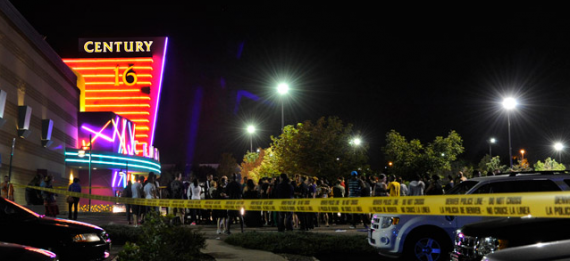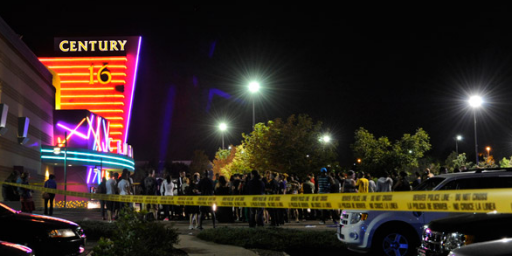James Holmes Found Guilty In Aurora Theater Shooting Trial
Almost exactly three years after the attack on a movie theater in Aurora, Colorado, James Holmes was found guilty late yesterday.
Almost exactly three years to the day after he went into a movie theater in Aurora, Colorado during a showing of The Dark Knight Rises and killed twelve people, a Colorado jury found James Holmes guilty on all charges related to that shooting:
CENTENNIAL, Colo. — Inside Courtroom 201, the families of the dead and wounded watched in taut silence on Thursday afternoon as the judge shuffled through a stack of verdict forms containing the fate of James E. Holmes, the gunman who slipped into a Colorado movie theater in 2012 and opened fire on their sons and daughters, friends and loved ones.
As the judge began reading the verdicts — guilty, guilty, guilty — repeated 165 times over an entire hour, for each count of murder and attempted murder, the families sobbed quietly, clutched one another’s shoulders and nodded along to a recitation of guilt that many had been waiting nearly three years to hear.
Sandy Phillips wrapped herself tightly in the green scarf that her slain daughter, Jessica Ghawi, had loved. A father whose son was killed patted the arm of Joshua Nowlan, who was wounded and now walks with a cane.
As each name of the 12 people killed and 70 wounded was read, and read again — prosecutors filed two charges per victim — the families looked to the corner of the public gallery and gave one another a quiet nod or an arm squeeze.
After an emotional 10-week trial, one of the longest and most complex in this state’s history, it took a jury of nine women and three men about 12 hours of deliberation over two days to convict Mr. Holmes on all counts. He now faces a lengthy sentencing process in which prosecutors are seeking the death penalty.
The jury’s verdict roundly rejected arguments from his defense lawyers that he had had a psychotic break and was legally insane when he carried out the massacre inside the Century 16 theater in suburban Aurora, Colo., on July 20, 2012. His lawyers argued he was not in control of his thoughts or actions, but prosecutors said Mr. Holmes, despite being mentally ill, had plotted the shootings with calculation and knew what he wanted to accomplish when he started firing into the crowd.
As Judge Carlos Samour Jr. read the 165 counts against Mr. Holmes, the defendant stood silently between his lawyers, staring straight ahead, with his hands tucked into the pockets of a pair of khaki-colored pants. He did not glance at his parents sitting two rows behind. When the hourlong recitation of the verdicts was done, he sat down and lightly swiveled in his chair.
Coming within days of the Aurora shooting’s third anniversary, the guilty verdict ends one phase of a grueling legal saga, but another one is set to begin.
As the district attorney in suburban Arapahoe County argues for the death penalty, the jury will begin weighing the toll and nature of Mr. Holmes’s actions to decide whether to send him to prison for life or to Colorado’s death row.
The sentencing phase is expected to take weeks. It could feature more wrenching statements from survivors and families of the victims, as well as testimony from defense witnesses discussing the role that mental illness played in propelling Mr. Holmes toward the movie theater that night.
“Look for the defense to emphasize the fact that James Holmes truly suffers from a serious mental illness, that he is in dire need of ongoing treatment and that while incarcerated he does not pose any real threat or danger to society,” said Steven Pitt, a forensic psychiatrist in Arizona who has followed the case closely. “Look for the prosecution to try and minimize the extent of Holmes’s mental illness and instead depict him as someone who is depraved and rotten to the core.”
The district attorney, George Brauchler, has said that for Mr. Holmes, “justice is death.”
Prosecutors argued that Mr. Holmes plotted the shootings for several weeks, deliberately and meticulously, because he had lost his first and only girlfriend, had dropped out of his graduate program and had generally lost his purpose in life.
To that end, prosecutors brought in professors and classmates who described Mr. Holmes’s struggles as a first-year graduate student in the neuroscience program at the Anschutz Medical Campus of the University of Colorado. Mr. Holmes quit the program in June 2012, after he failed important oral exams, and declined the chance to retake them.
Prosecutors showcased pages from a spiral notebook in which Mr. Holmes inscribed murderous fantasies and nonsensical theories about life and death, and where he plotted what kind of attack to carry out, and how and where to do it.
But where prosecutors saw calculation, the defense saw “a whole lot of crazy.”
Two psychiatrists who testified for the defense said Mr. Holmes lacked the ability to tell right from wrong or act with intent — critical elements of sanity under Colorado law.
Their testimony clashed with two court-appointed psychiatrists who said that although Mr. Holmes suffered a severe mental illness on a spectrum with schizophrenia, he was not legally insane when he walked into the theater.
Given the fact that Colorado’s rules regarding the defense of mental illness are somewhat different from other states, essentially requiring the prosecution to present evidence rebutting the Defendant’s claim as part of their case in chief, there were some observers who wondered whether Holmes’s defense might actually succeed notwithstanding the fact that mental illness is a defense that rarely succeeds today. In the end, though, Holmes’s lawyers ran into the same problem that every other attorney that attempts to present this defense has been running into for decades now, namely that it’s simply next to impossible to meet that bar that the mental illness defense presents. Essentially, it requires the defense to establish that the defendant was unable to appreciate the nature of their acts and unable to recognize that what they were doing was wrong. In Holmes’s case, the extensive preparations he took before carrying out the attack, the manner in which he had bobby trapped his apartment in a manner that could have potentially caused significant destruction had it not been disarmed, and that he made at least some effort to escape after the attack all stood as counter-examples to the argument that he was legally insane at the time of the attack. In the end, of course, the defense likely knew this and there was never really any question that Holmes was responsible for the shootings themselves, so this outcome wasn’t too much of a surprise.
From here, the case moves on to the sentencing phase at which the jury will decide whether Holmes will be sentenced to die or spend the rest of his life in prison. The defense will likely rely heavily on Holmes’s mental state in this phase of the trial as well, and may have more success than it did in the guilt phase of the trial. It’s also worth noting that Colorado has only executed one person since death penalty was reinstated by the Supreme Court in 1976, and that execution occurred in 1997. The heinous nature of Holmes’s attacks is likely to weight heavily on the sentencing phase, as it did in the guilt phase, but he would seem to have at least somewhat of a shot of avoiding the needle at the end of the process.







We all owe a death. But life in prison?
Except that even people who have life in prison manage to sometimes escape, I’d say shove him into a cell and let him rot.
(It’s times like this when I think harvesting people for their body parts has a certain elegant logic. He killed 12 people? Let his body parts save 12 people. Then turn him loose, if he has sufficient organs left to keep him alive. fair’s fair.)
We were on the path towards making this de facto death penalty ban official, but James Holmes set that argument back. I expect Holmes to get the death penalty.
I also expect the death penalty to stand (legally) until he’s dead, either of natural causes or execution.
Put him in the prison general population.
*cue rant*
I have always felt the mental illness is a complete BS legal escape clause every guilty person considers to see if they can get away with. I can understand a “diminished capacity via biological impairment/defect” rationale – this way, someone who is severely autistic or has an IQ of 36 for example doesn’t get screwed over by simple dint of literally not being able to understand/comprehend the situation. There’s no point in punishing someone who can’t grasp why this is happening. But true mental illness is rare, violence-causing ones even rarer. I can’t stress this enough: the vast, vast majority of people with mental illness are not violent. It’s a horrible stereotype that needs to stop. The insanity defense needs to disappear ASAP as it furthers the public perception of this. If you have a documented history of not being able to discern physical reality from a bread-stick, you get a pass. But depression, personality disorders, rage issues….. nope, no excuse. Do the crime, do the time.
Society needs to get that crazy is not the same as mentally ill. Crazy is the term we use for abnormal thinking – that is, something that’s not what your average person would do or consider. Crazy is lighting a firework on top of your head, crazy is attacking an innocent because your interpretation of your faith says so, crazy is killing an alligator that killed your drunk friend as justice instead of realizing your dumb friend died due to his own stupidity. Society is saturated in crazy; it is an instance or a lifestyle. Mental illness is just that, an illness. Something wrong with the body and/or mind that is identifiable and treatable. It’s a condition, not a choice.
James Holmes is a crazy-ass SOB. He’s not mentally ill. He’s just a horrible person with issues.
@KM: Not my field, but I’ve read that the origin of the insanity defense was completely different than current US usage. Maybe one of our attorneys has better history, but IIRC the story revolved around the assassination of a political figure in England. The assassin was insane. Obviously, seriously insane, with no idea of what he’d done. Nobody could quite bring themselves to execute the guy basically for being insane, so they came up with the concept that under British law he was entitled to defend himself, and since he obviously was incompetent to do so, they couldn’t try him. Not that he wasn’t guilty, but that they couldn’t try him. So he spent the rest of his life in an asylum. That seems logical and straightforward.
It gets complicated if by therapy, drugs, or passage of time he becomes sane. My take would be that if a statute of limitations has run out, well, there you are. If not, you try him with the prior insanity relevant as mitigation at sentencing but not to guilt. He did the act or he didn’t. I fail to see what this whole legal concept of “ability to tell right from wrong” has to do with anything, or how it can possibly be known.
What puzzles me is the length of these trials. Think about this: Nuremburg trials of top Nazis – 11 months; Al Capone trial – months; Charles Manson – 6 months, even with his ranting, raving, rambling.
This was an open and shut case, no doubt of guilt. Why the length ?
@gVOR08:
Hmmm… I didn’t know that regarding the origins. That’s makes perfect sense from a legal, moral and ethical standpoint. But you’re right, it’s not being used the way it’s intended nowadays.
IMHO i don’t think that should be a factor at all, anymore then if a killer feels truly guilty by the time the trial rolls around. If an DUI multiple offender suddenly goes teetotaler after running over a kid, should that mitigate the fact that a kid is dead because he was drunk at the time? Your status at the time of the crime should be what matters.
Generally speaking, one doesn’t “become sane”. That very notion – that one can slide in and out of sanity at random – relies on the assumption that the “sane” state is the norm and the “insane” state is a temporary aberration. It’s actually the opposite in that “insane” state is consistent and the action is a visible manifestation of it. One can have not have episodes for years but the baseline condition remains. An epileptic is still epileptic even if they are not currently mid-seizure. One is still schizophrenic even if they are having a particularly good day. This is why the illness concept is so hard to get across to people – mental illness tends to be for life. You may get better but you are not and will not be cured. It’s not going away with a cheerful attitude and some pills; you’re in for the long haul.
@Tyrell:
Short answer is: different courts, different defense strategies, different laws.
@Tyrell:
Why the length?
Each case is unique, but there are a variety of reasons a trial can take a long time. In this case, there were many factors:
– Holmes waived his right to a speedy trial.
– Defense requested more time to have professionals assess Holmes’ mental health.
– Prosecution added additional charges and amended many of the initial charges.
– Defense requested a postponement of the preliminary hearing, twice, the second time because of several suicide attempts by the defendant.
– After the preliminary hearing, the judge delayed the plea hearing by two months (not sure why).
– Defense offered a guilty plea in exchange for avoiding the death penalty. This was rejected, but caused further delay of the trial.
– Prosecutors decided to pursue the death penalty, which pushed the initial trial date back to deal with “issues” that needed to be resolved for such a case to proceed (I’m not exactly sure what these were).
– Holmes was placed in a mental health facility, which I believed pushed back the trial date setting.
– Defense fought against the order for a second psychiatric evaluation, which caused further delays.
– The second doctor asked for an extension, then wanted to videotape the evaluation, which the defense objected to. Further delays.
– When the trial date in December 2014 approached (after 3 long postponements), the defense asked for another continuance.
– Once the trial finally commenced, there was the matter of the jury pool, which was the largest in history with 9,000 potential jurors. As you would expect, jury selection took a while.
– The trial finally began on April 27, and took less than three months to conclude, including delays as no less than five jurors were dismissed (3 discussed news reports about the case; one had a brother-in-law shot in a robbery and was distraught; the fifth juror knew one of the victims).
Tl;dr – Lawyers have a lot of ways to delay the start of a trial, and judges are often willing to allow these delays. Once it commenced, the trial itself didn’t take very long for a case with so many victims and witnesses. Insanity pleas and death penalty cases (unusual in Colorado) can also create considerable delays.
@Tyrell: Considering the number of victims who testified, it could have gone longer.
@mantis: If the Nuremburg trials had gone through all of that legal rigamarole, most of the defendants would have died of old age before it was over.
@Tyrell:
The Nuremburg trials lasted 11 months.
The Holmes trial lasted 11 weeks.
@Tyrell:
Military tribunals are not really comparable to domestic criminal trials. Plus, as Pearce notes, the Nuremberg trials took quite a while.
@Tyrell: While in prison the entire time.
@Tyrell: That “legal rigamarole” that you sneer at is called Due Process, and you should be damn glad we have it.
You’re certainly going to be appreciative of it when you travel to a foreign country that doesn’t have it and you discover how easy it can be to jump from Accused to Dead.
@James Pearce: I was considering the time from to be starting on the date of arrest.
@Tyrell: I take your point, but I think the trial was rather swift, all things considered. It could have all been avoided had he just pled guilty. But I appreciate that the defense didn’t cross-examine a single victim. There were a lot of them and a more cynical defense team could have really strung that out.